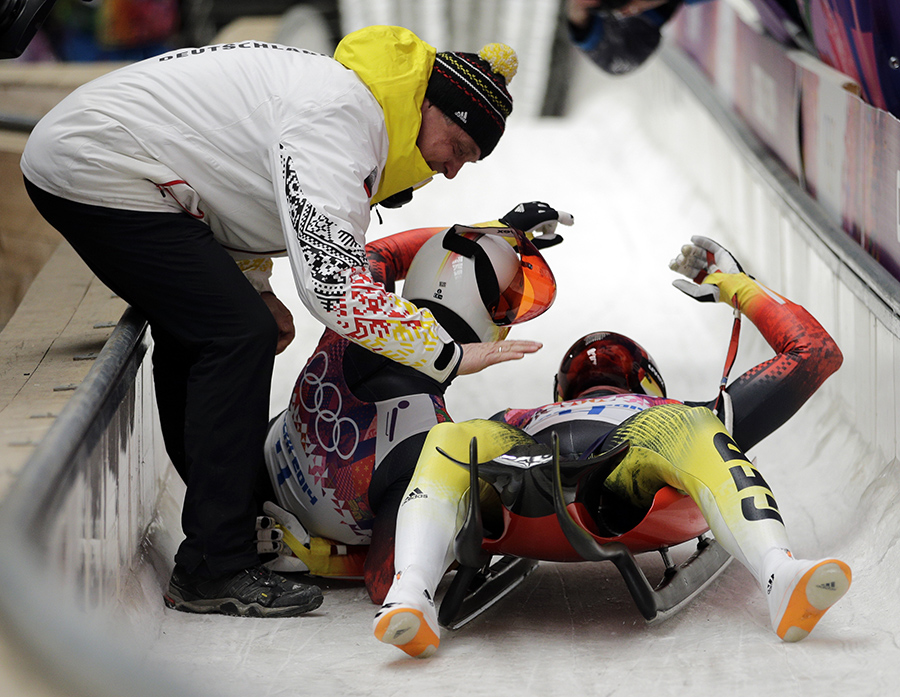KRASNAYA POLYANA, Russia — On Russian ice, Germany is making itself at home.
The world’s sliding superpower won its third straight gold medal in luge at the Sochi Games on Wednesday night as Tobias Wendl and Tobias Arlt captured the doubles competition.
Known as “The two Tobis,” Wendl and Arlt completed their two trips down the Sanki Sliding center track in 1 minute, 38.933 seconds, 0.522 ahead of Andreas and Wolfgang Linger of Austria, who were trying to become the first doubles team to win gold three times in a row.
Andris Sics and his brother, Juris, won the bronze in 1:39.790. The Sics, who won silver four years ago in Vancouver, began the second run in fifth place but jumped Canada’s Tristan Walker and Justin Smith as well as Austria’s Peter Fenz and Georg Fischler, who nearly crashed on their last run and dropped all the way from third to last — 5 seconds behind the champions.
Wendl and Arlt had no such issues and their last run down the 17-curve track was as clean as so many other they’ve made in the past few months.
“Victory lap,” said Jayson Terdiman of Lake Placid, N.Y., as he and teammate Christian Niccum watched the Germans carve the ice. “It’s very rare they make mistakes. They’ve had it all week.”
“They’ve had it all year,” added Niccum of Woodinville, Wash., who finished 11th in what was likely his final race.
Three races. Three golds. Wunderbar.
With luge legend Georg Hackl coaching the team’s biggest stars, the Germans are giving this picturesque area high in the Caucasus Mountains a very Bavarian look.
Wendl and Arlt followed dominant, gold-medal winning performances by Felix Loch in men’s singles and Natalie Geisenberger in the women’s race with one of their own. They had a 0.312 lead over the Lingers after their first run, and only needed to avoid a major mistake on their second time down to give Germany its 10th gold in 14 doubles races since 1964.
Once they had clinched their medal, Wendl and Arlt, also referred to as “The Bayern Express” celebrated with Hackl and Germany’s other coaches.
“They push us to be great,” Arlt said. “We know how strong they are and we compete with them. We push each other. That’s how we are great.”
It’s the first time the powerful Germans, who have now won 70 of 120 luge medals awarded in the past 50 years, have won the men’s, women’s and doubles luge titles in the same winter games since 1998 at Nagano.
And now, the high-performance German sledding machine gets to combine all its parts on Thursday when the relay event makes its Olympic debut.
Talk about a dream team.
Four years ago on Whistler’s track, the Linger brothers won a second gold to display alongside the pair they got in 2006 at Turin. In winning consecutive titles, they matched Germany’s Hans Rinn and Norbert Hahn, who finished atop the podium in 1976 at Innsbruck and 1980 at Lake Placid, as the only back-to-back winners.
However, their bid for a third straight title was denied by the Wendl-Arlt tandem, who ran away from the pack all season and weren’t going to be caught by anyone on this night.
The Romanian team of Radu Sovaiala and Alexandru Teodorescu was dropped from the race after officials deemed their sled was not the proper size.
The other American sled, Matthew Mortensen of Lake Placid, N.Y., and Preston Griffall of Salt Lake City, finished 14th.
The doubles competition was held on a somber anniversary for the luging community.
Four years ago at the Vancouver Games, Georgian luger Nodar Kumarishtavili was killed when he was thrown from his sled at more than 90 mph and struck his head on an exposed steel pole near the finish line of the Whistler Sliding Center track. The 21-year-old’s death prompted Sochi officials to design the Sanki track with three uphill sections to reduce speeds and hopefully avoid another tragedy.
Earlier in the day, IOC President Thomas Bach joined International Luge Federation officials for a moment of silence at their executive board meeting, not far from the Sanki facility.
With only one luge event to go, there have been no major crashes, and athletes have been very pleased with the condition of the world’s longest track.
To this point, it’s been an icy Autobahn.
Send questions/comments to the editors.


